|
|
|
Sort Order |
|
|
|
Items / Page
|
|
|
|
|
|
|
| Srl | Item |
| 1 |
ID:
095112
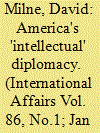

|
|
|
|
|
| Publication |
2010.
|
| Summary/Abstract |
Historians and journalists such as Richard Hofstadter and Susan Jacoby have decried the reality 'of anti-intellectualism' in American society, culture, and politics. Yet intellectuals have played a vital role in shaping US diplomacy-from Alfred Thayer Mahan to Paul Wolfowitz. This article explores the varied reasons why the US government has proved so amenable to input from academia, think-tanks and freelance intellectuals. It first discusses the varying ways in which 'the intellectual' has been defined, and proposes criteria that allow us to identify the foreign policy intellectual. Second, the article examines the historical circumstances that have allowed intellectuals-broadly conceived-to influence US diplomacy from 1890 to the present; focusing on the proliferation of US colleges through the nineteenth century, pioneering attempts to utilize the academy such as Robert La Follette's 'Wisconsin Idea', the professionalization of US higher education inspired by the achievements of Germany's research universities and the strong links forged between academia, think-tanks and government through the progressive era, two world wars, and into the Cold War and beyond. Third, the article compares the US experience of welcoming intellectuals into policy-making with that of the United Kingdom and France, the two democracies that have displayed a global ambition comparable to the United States in recent history. The article concludes with a discussion of the intellectual types-historian or IR scholar, generalist or specialist, fox or hedgehog-that are best suited to dispensing foreign policy advice. It warns that those intellectuals with theories to prove often lack the cognitive flexibility required when making diplomacy.
|
|
|
|
|
|
|
|
|
|
|
|
|
|
|
|
| 2 |
ID:
095120
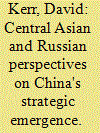

|
|
|
|
|
| Publication |
2010.
|
| Summary/Abstract |
This article employs fieldwork research and literature analysis to examine contemporary perceptions of China's emergence in popular and elite opinion in Russia and the Central Asian states, particularly Kazakhstan. It initially establishes a framework for understanding China's emergence, emphasizing a trilateral dynamic between the hegemonic position of the US in Asia, the evolution of the strategic choices of China's neighbours and the development of strategic regionalism as a mechanism for managing regional spaces. Choosing to take the Commonwealth of Independent States as a particular case of this framework, it argues that the interaction between Russia, China and the US remains highly fluid, particularly under the conditions 'of re-setting' the US-Russian relationship. This means that regional contexts are highly significant; and it establishes Central Asia as an important new strategic region for working out relations between Russia, China, and the US through their interactions with regional states. The second part of the article examines Russian and Central Asian responses to China's emergence. It looks at three categories of motivation in China's regionalism: its system for accumulative growth; its problems with weak constitutionality and transnational security in its western regions; and its concern with US/NATO encroachment on its western frontier and the US attempt to turn Central Asian elites away from their traditional alignments. The third part looks at China's promotion of the Shanghai Cooperation Organisation (SCO) as its mechanism for strategic regionalism in Central Asia. The article questions the SCO's significance in terms of its capacity for governance and functionalism, and points to the problem of institutional competition, notably with Moscow's preferred structure of the Collective Security Treaty Organization. The article concludes that China will be an unconventional superpower that presents different facets of itself in different regional contexts. There will not be a single model of China's emergence and it will continue to develop its international role through a mix of adaptation and experimentation. However, China's strategy will pose a problem for Russia and Central Asia since it seeks to create a strategic space that does not challenge the West, but exists substantially outside the West. Russia, in particular, has to decide whether it will be able to maintain its current stance of independence between Europe and Asia as China's rise shifts the frontiers between East and West.
|
|
|
|
|
|
|
|
|
|
|
|
|
|
|
|
| 3 |
ID:
095108
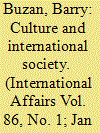

|
|
|
|
|
| Publication |
2010.
|
| Summary/Abstract |
This article investigates a hypothesis drawn from Martin Wight, that a society of states lacking a shared culture, as a result of expansion beyond its original base, will be unstable. This instability hypothesis has been influential in how the English School has presented the history of the expansion of European international society to a global scale. The article starts by offering two models of how a global international society could have come about since the late classical era: a multicultural encounter among several expanding civilizations (polycentric), or the takeover of the system by one centre (monocentric). Using these models as a backdrop, two accounts of the expansion story are developed. The Vanguardist account emphasizes the exceptionalism of European culture, posits a 500-year period of western domination, sees multiculturalism and the decline of western power as problematic, and tends to pessimism about the future of international society. The Syncretist account emphasizes the permanence of cross-cultural exchange, posits only a 200-year period of western dominance, sees culture and international society as evolving together, and is not pessimistic about the stability of international society. These two models and two accounts are then used to assess the possible future of international society. The article argues that culture is less of a problem for international society than Wight, and much of the English School, suppose. The evidence for the substantial success of syncretism is strong and provides considerable stability to most of the likely outcomes. The key problem is not culture, but socio-political structure. How can what North et al. call natural states and open access orders find shared practices and institutions that do not destabilize international society?
|
|
|
|
|
|
|
|
|
|
|
|
|
|
|
|
| 4 |
ID:
095116
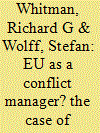

|
|
|
|
|
| Publication |
2010.
|
| Summary/Abstract |
This article offers an analysis of the EU's engagement in Georgia as a standpoint from which to assess the EU's role as a conflict manager. The article begins with a brief narrative account of the development of EU-Georgia relations in the context of the country's two unresolved conflicts over Abkhazia and South Ossetia. It then proceeds to the analysis of two sets of factors-those within, and those external to, the EU-that are crucial for understanding the nature and impact of EU efforts to manage the two Georgian conflicts. On the basis of this case-study analysis, the authors offer a wider analysis of the EU's potential for assuming a wider role as an international security actor. This is undertaken by considering both the limitations of the EU's existing capabilities for conflict resolution and the new developments contained within the Lisbon Treaty. The final part of the article asserts that the EU has suffered from two key weaknesses that have prevented it from living up to its aspirations of becoming a globally significant and effective conflict manager. The first is structural-the lack of, to date, a permanent External Action Service; the second is conceptual-the lack of a coherent and comprehensive conflict management strategy. The article concludes with five substantive principles that should guide the EU's approach to conflict management.
|
|
|
|
|
|
|
|
|
|
|
|
|
|
|
|
| 5 |
ID:
095127


|
|
|
|
|
| Publication |
2010.
|
| Summary/Abstract |
HIV/AIDS is one of the greatest single causes of death and suffering on the planet. Over the last decade the societal impact of HIV/AIDS has been widely discussed in terms of national and international security. This article assesses the securitizing move and suggests that HIV/AIDS was only partially securitized at best and both the political consensus and strength of evidence were overestimated. It argues for greater nuance in our understanding of the link between HIV/AIDS and security, and the effects of its securitization, suggesting that neither is straightforward, and both are subject to case sensitivities.
|
|
|
|
|
|
|
|
|
|
|
|
|
|
|
|
| 6 |
ID:
095125
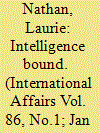

|
|
|
|
|
| Publication |
2010.
|
| Summary/Abstract |
This article explores the functions and impact of the South African constitution in relation to the country's intelligence services. The constitution has proved to be a powerful instrument for transforming, controlling and constraining the services, safeguarding human rights and contributing to the management of political conflicts and crises. Yet the constitution's relevance for the intelligence community is also contested and contradictory. Paradoxically, the executive, parliament and the intelligence services believe that it is legitimate for the services to deviate from constitutional provisions because their mandate to identify and counter threats to national security is intended to protect the constitution. The article contributes to filling a gap in the literature on security sector reform, which is concerned with democratic governance but ignores the role of a constitution in regulating the security organizations and determining the nature of their governance arrangements. Intelligence agencies around the world have special powers that permit them to operate with a high level of secrecy and acquire confidential information through the use of intrusive measures. Politicians and intelligence officers can abuse these powers to manipulate the political process, infringe the rights of citizens and subvert democracy. While a constitution cannot eliminate these risks, it can establish an overarching vision, a set of principles and rules and a range of mechanisms for promoting intelligence transformation and adherence to democratic norms.
|
|
|
|
|
|
|
|
|
|
|
|
|
|
|
|
| 7 |
ID:
095118


|
|
|
|
|
| Publication |
2010.
|
| Summary/Abstract |
To what extent does Russia face the threat of Islamic radicalization? This article provides an assessment of the nature and severity of the threat and its changing dynamics from the Yeltsin to the Putin periods in post-Soviet Russia. It argues that, contrary to many accounts, the threat was at its greatest during the late 1990s and in the Yeltsin period. Moreover, the Putin administration adopted a series of policies that have had some significant successes in stemming the flow of Islamic radicalism within Russia. This has involved a policy mix, including repression and coercion, most notably in the military campaign in Chechnya; diplomatic efforts in the Middle East and broader Muslim world to improve Russia's image; pro-active domestic policies to co-opt and support moderate Russian Muslim leaders and their communities; and attempts to construct a national identity and ideology which supports the multi-confessional and multinational nature of the Russian state and recognizes the Muslim contribution to Russian statehood and nationality. Although these policies have had their successes, there are also significant limitations, the most notable of which is the failure to address the problems of poor governance in the North Caucasus, which has sustained the Islamist insurgency in the region. The failure to develop an intermediary Muslim civil society in Russia more generally also contributes to the continuing appeal of Islamist radicalism, particularly among younger Russian Muslims.
|
|
|
|
|
|
|
|
|
|
|
|
|
|
|
|
| 8 |
ID:
095121
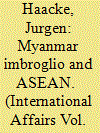

|
|
|
|
|
| Publication |
2010.
|
| Summary/Abstract |
Following the adoption of a new constitution by national referendum, Myanmar's military junta is set to organize multiparty elections in 2010. Not least to influence Myanmar's leadership, with regard to the conditions Washington believes necessary for credible elections, the United States announced in September 2009 that it would embark on a new approach towards Naypyidaw. This will focus on a high-level dialogue while keeping existing sanctions in place. The Obama administration has asked the Association of Southeast Asian Nations (ASEAN) to support this new approach. Against the backdrop of the deep divide between the ruling generals and Aung San Suu Kyi, and the continued conflict between Naypyidaw and armed ethnic nationalities, this article asks: How strong is ASEAN's record when it comes to influencing the State Peace and Development Council (SPDC) in relation to matters of national reconciliation and political transition? What factors explain ASEAN's approach towards Myanmar? What prospect, if any, is there that ASEAN states can influence Myanmar's political developments before the 2010 elections? The article argues that ASEAN has not moved beyond a collective criticism which aims to induce Naypyidaw to respond positively to the demands of its international detractors. ASEAN's norms, different political identities and geopolitical interests coupled with the SPDC's prickliness have limited the consensus on Myanmar. Naypyidaw's calculations about relations with Washington, rather than ASEAN's 'enhanced interactions' with the military government, and domestic political dynamics are likely to be the crucial determinants of further developments in the context of the 2010 elections.
|
|
|
|
|
|
|
|
|
|
|
|
|
|
|
|
| 9 |
ID:
095114


|
|
|
|
|
| Publication |
2010.
|
| Summary/Abstract |
A successful outcome of the 2010 Nuclear Non-Proliferation Treaty (NPT) Review Conference is widely seen as vital if the NPT is to continue to play an important role in preventing nuclear proliferation. Focusing on the concept of trust, this article offers a novel perspective on the treaty and its future prospects. Too often dismissed as impossible or dangerous in international politics, trust has received little attention from both academics and practitioners. This article challenges this predominant view by making a case that the NPT establishes and embodies a series of trusting relationships between states. Trusting relationships are analysed as a way in which states relate to each other, taking into account both interests as well as promises. It does not make the case that once such relationships are established they will remain constant, but rather that trusting relationships are dynamic. They can be strengthened or weakened depending on the choices of actors. The article shows how trusting relationships have underpinned the NPT from its beginning and charts their evolution by reference to three key sets of relationships. These are, first, the relationships between the recognized nuclear weapon powers and the non-nuclear weapon states; second, those among the recognized nuclear weapon states; and third, those between the NPT signatories and those states remaining outside of the treaty. For each set of relationships the problems and issues that have eroded trust are outlined and the steps that might lead to the overcoming of these strains and the strengthening of the trusting relationships are discussed. By understanding the NPT through the prism of trust, the article sheds new light on both the achievements of the treaty as well as its potential fragility. At the same time, such an analysis opens up the directions of policy crucial to strengthening the treaty at the Review Conference and beyond.
|
|
|
|
|
|
|
|
|
|
|
|
|
|
|
|
| 10 |
ID:
095126
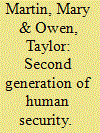

|
|
|
|
|
| Publication |
2010.
|
| Summary/Abstract |
The concept of human security, while much contested in both academic and policy debates, and highly fragmented across different meanings and forms of implementation, offers a potential locus around which global security discourse might converge, particularly in light of current shifts in US security thinking. However, key pioneers of human security, such as the United Nations and Canada, appear to be losing their enthusiasm for the concept, just at the moment when others such as the European Union, are advancing a human security agenda. This article examines the divergence of human security narratives between the UN and the EU. It argues that the UN's use of the concept ran aground owing to a triple problematic of lack of clarity, confusion between previously distinct policy streams on human rights and human development and conceptual overstretch. After assessing the EU experience with the concept to date, the article argues that future use of human security will require greater focus on how it deepens ideas of individual security, rather than treating it as an agenda for broadening security. As well as a need to project clarity on the conceptual definition of human security, there is also a need to associate human security with greater clarity of intent. If successful, this would contribute to establishing second generation human security as a new policy paradigm.
|
|
|
|
|
|
|
|
|
|
|
|
|
|
|
|
| 11 |
ID:
095124


|
|
|
|
|
| Publication |
2010.
|
| Summary/Abstract |
Myanmar has been one of a number of countries that the new American Executive branch selected for policy reconsideration. The Obama administration's review of relations with Myanmar, characterized as a 'boutique issue' during the presidential campaign, has received considerable attention in 2009, and in part was prompted by quiet signals sent by both sides that improved relations were desirable. Begun as an intense policy review by various agencies, it has been supplemented by the first visits in 15 years to the country by senior US officials. The policy conclusion, that sanctions must remain in place but will be supplemented by dialogue, is a politically realistic compromise given the strong congressional and public antipathy to the military regime and the admiration for Aung San Suu Kyi, whose purported views have shaped US policies. US claims of the importance of Myanmar as a security and foreign policy concern have also been a product of internal US considerations as well as regional realities. US-Burmese relations since independence have been strongly influenced by the Cold War and China, whose strategic interests in Myanmar have been ignored in the public dialogue on policy until recently, with US policy focused on political and human rights concerns.
Attention is now concentrated on parliamentary and local elections to be held in 2010, after which the new constitution will come into effect and provide the military with a taut reign on critical national policies while allowing opposition voices. Future relations will be strongly influenced by the transparency and freedom both of the campaigning and vote counting, and the role-if any-of the opposition National League for Democracy. Strong scepticism exists in the US on prospects unless the Burmese institute extensive reforms. The Burmese military, presently controlling all avenues of social mobility, will have a major role in society for decades. The article initially evaluates US policies towards Myanmar prior to 1988, when a military coup marked a negative shift in US-Myanmar relations, from cooperation to a US sanctions regime. It looks at the influence China's involvement in Myanmar and the role Aung San Suu Kyi have had on the formulation of US policy towards the country and assesses the prospects for the US-Myanmar relationship under the Obama administration.
|
|
|
|
|
|
|
|
|
|
|
|
|
|
|
|
| 12 |
ID:
095110
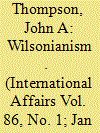

|
|
|
|
|
| Publication |
2010.
|
| Summary/Abstract |
Americans have generally seen the principles and objectives proclaimed by President Woodrow Wilson during the First World War as having continued relevance for United States foreign policy. However, they have often differed over their application to specific situations, particularly because there is likely to be a tension between a drive to establish democratic values across the globe and commitment to a universal system of collective security. Rather than seeking a pure, abstract definition of 'Wilsonianism', it is more illuminating to examine its origins and evolution in relation to the development of American foreign policy over the years. Tracing this historical process reveals that Wilson committed himself to a postwar league of nations during the period of American neutrality, but it was only as the United States became a belligerent that the spread of democratic government became a policy objective, and then only in a partial and qualified way. A similar pattern has been discernible in subsequent decades. It has been during conflicts, or the run-up to them, that the more ideological and revisionist aspects of Wilsonian principles have come to the fore, whereas it has been in the aftermath of conflicts that there has been the greatest interest in the potentialities of a universal collective security organization. There has also been a broad shift of emphasis over time. As confidence in America's power position has grown, the core of Wilson's legacy has more often come to be seen as the promotion of democracy rather than the strengthening of international institutions. The persistence of both themes may be seen as reflecting basic and enduring elements of the policy-making context-on the one hand, the interests of the United States as a status quo power, and on the other, the demands of domestic American opinion.
|
|
|
|
|
|
|
|
|
|
|
|
|
|
|
|
|
|
|
|
|